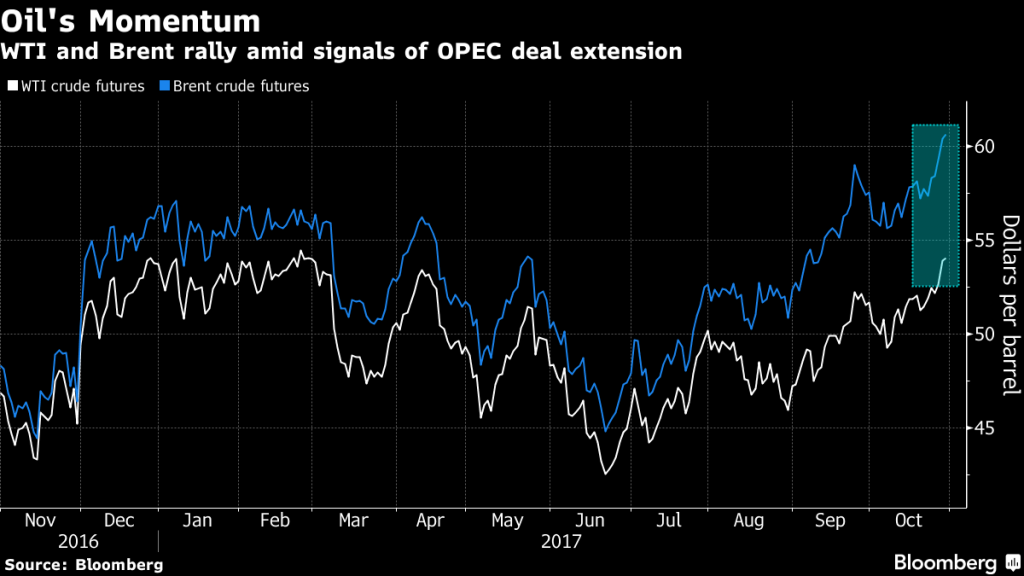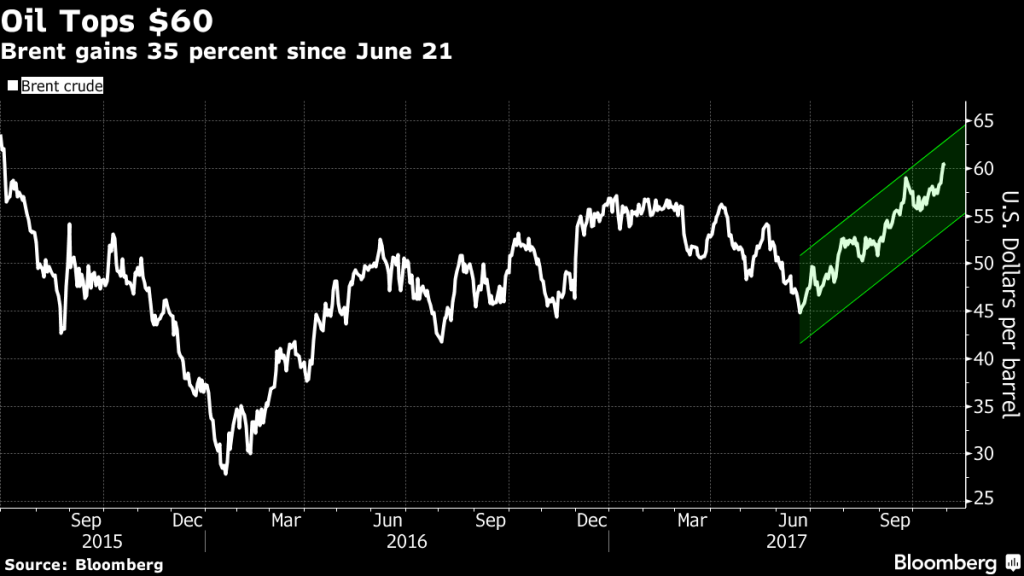
Brent crude extended its rally to a two-year high as OPEC and Russia signaled they’ll prolong supply cuts, while instability in Iraq’s Kurdish region persisted.
The global benchmark rose 0.8 percent, and West Texas Intermediate gained 0.5 percent, though both crudes pulled back from Monday’s highs as they moved closer to levels that signal they might be overbought. Supporting the rally was Saudi Arabian Crown Prince Mohammed bin Salman last week backing an extension of production cuts by OPEC beyond March, following similar signals from Russian President Vladimir Putin.
“OPEC is doing a good job of talking up their position. That put a bid in the market coming into today,” Bob Yawger, director of the futures division at Mizuho Securities USA Inc. in New York, said by telephone. The issues in Kurdistan have “not ended yet. There’s still some potential bid from that.”
Oil has climbed this month as investors wait to see whether OPEC will formally agree to an extension of its cuts at a meeting in November. On Monday, JPMorgan Chase & Co. raised both its Brent and WTI 2018 forecasts. Yet, both Brent and WTI’s 14-day relative strength index moved toward 70, indicating the commodity may be overbought.
“When you’re in a range-bound market without a lot of really clear and definitive fundamental information, people tend to start trading off of technicals,” Bill O’Grady, chief market strategist at Confluence Investment Management in St. Louis, said by telephone. “Momentum in oil has been pretty strong, so unless you’ve got something out there that tells you we are on a clear path to $60, you’re going to want to see how the data plays out.”
Brent for December settlement, which expires Tuesday, rose 46 cents to settle at $60.90 a barrel on the London-based ICE Futures Europe exchange, the highest close since July 2015. The global benchmark crude traded at a premium of $6.75 to WTI.
See also: Oil Investors Roll the Dice on OPEC as Saudi Prince Ups the Ante
WTI for December delivery added 25 cents to end the session at $54.15 a barrel on the New York Mercantile Exchange, the highest level in eight months. Total volume traded was about 17 percent below the 100-day average.
Oil exports resumed from Iraq’s Kurdish region after halting earlier Monday, a port agent said, highlighting uncertainty about pipeline shipments from OPEC’s second-biggest producer.
The halt came days after Iraqi troops captured oil fields from Kurdish fighters in northern Iraq’s disputed Kirkuk province. Shipments by pipeline averaged 264,000 barrels a day before the stoppage, less than half their normal daily level of 600,000 barrels. Exports from Kirkuk, which had been flowing through the same pipeline network to Ceyhan, remained halted as of Monday, the port agent said.
Oil-market news:
Cushing, Oklahoma crude stockpiles declined 150,000 barrels last week, according to a forecast compiled by Bloomberg. Iraq added a fifth offshore crude-exporting facility with a capacity of 900,000 barrels a day to boost shipments by sea, the nation’s oil ministry said in an emailed statement, citing Minister Jabbar al-Luaibi. The U.A.E. is disclosing oil allocations to customers every month, and other countries should follow suit, Energy Minister Suhail Al Mazrouei told reporters in Abu Dhabi.
